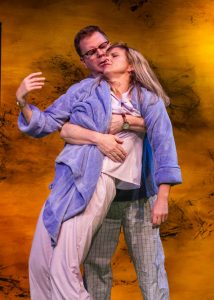SD Rep’s ‘Detroit’: Actions Speak Louder Than Words
You can tell San Diego Repertory Theatre’s current Detroit was an absolute blast to rehearse. Its stream-of-consciousness dialogue and physicality demand wholesale creative license in the theater games the cast must have played; and director Sam Woodhouse is a champ here at harnessing the colossal explosion of random energy.
This phrase isn’t original with me, but it fits like a glove: Everybody’s work in this show is across the street from everybody else’s, and the cast members acquit themselves as a perfectly adept clutch of farceurs.
The let-down sets in when all that work is mounted against Lisa D’Amour’s script. The story seems far livelier than it is as the cast and techies push it beyond its limits, and the result is a spectacle that seriously trumps the message. I’m not being flip when I say that Detroit makes for some very decent burlesque, and I love the title because it defies explanation, but D’Amour’s hollow flights of fancy, and one surprisingly incomplete character sketch, hobble the big picture as this piece seeks to become a play.

Mary, Sharon and Kenny (from left, Lisel Gorell-Getz, Summer Spiro and Jeffrey Jones) have no idea where their new friendship is about to take them. Photos by Daren Scott.
It took some time, as it always does, but Mary and Ben have managed to maybe, kind of, sort out married life in the suburbs of a midsize American city in 2008. She’s a (probably bored) paralegal; he’s a nerdy nouveau entrepreneur who thinks he wants to start a financial counseling business (“If you follow your passions, you’re halfway there”). Though young, these two clearly have a few years on sketchy, overly friendly new neighbors Kenny and Sharon, who’ve moved in next door with nary a stick of furniture and a druggie past for their trouble (they didn’t know it for a while, but they’d met even before they wound up in rehab together).
The couples trade small talk and dinner invitations until D’Amour takes off the gloves—what follows is billed as her take on the state of our culture amid its notions of neighborhood, security and the American Way. Many forces are at work in our lives, she seems to say, and the tiniest fraction of those fall under our control. Those passions Ben talks about, and sometimes even some people, are rarely as they seem.
You can (almost) always count on me to defend actors’ approaches to shows like this, for one perfectly good reason: Farce is far harder to perform than it looks, because it declares itself through absurd situations rather than through characters. Actors must constantly fight the natural urge to develop the people they portray in favor of the craziness in the script—and this cast has that concept down cold and then some. Kenny’s lumbering simpiness feeds ditzoid Sharon’s soft spot for her ancient drug highs; her addled worldview piques Ben’s and Mary’s relatively predictable lots in life. Even amid their loopiest states of animation, what the actors portray is more critical than how they portray it; bringing that concept to the stage is very, very difficult indeed, and Woodhouse has done a remarkable job at it.
But as the action literally boils over, D’Amour is rarely to be found. Her dialogue, potty and clever at first, looks lame and hastily conceived when she tries to address the play’s larger issues (imaginary dogs taking fake poops on a neighbor’s lawn is hardly a show of the unbridled rebellion one scene demands; the girls’ camping trip fail is stale and unremarkable; hints at sexual attraction between the others’ mates look like afterthoughts; and the undertone of daily discontent rarely makes it out of the neighborhood in any event).

There’s more to life than moments behind closed doors, as Ben (Steve Gunderson, left) and Mary (Lisel Gorell-Getz) silently suspect (or already know).
And D’Amour’s Mary is highly underdone—while Ben’s accident-proneness and Kenny and Sharon’s post-rehab affectations help define them, Mary’s most unique features revolve around a pesky wart on her foot and (in only one scene) her dangerous fondness for booze. She’s out of place amid a group that at least has a past to share.
Pretty Summer Spiro is a total pistol as Sharon—the drug culture’s desperation clearly drives this character, and Spiro’s funny, over-the-top histrionics give that trait a human face. Jeffrey Jones’ Kenny is lost and sympathetic amid a body language that betrays a fairly nice guy underneath. Lisel Gorell-Getz gives Mary a nice bray to go with the poorly drawn character, and Steven Gunderson is ideally cast to type as Ben. (For some nutty reason, Sharon thinks all-American Ben must be British, and with his glasses and his pudding face, Gunderson looks not unlike Elton John.) Robert Benedetti acquits as old Frank, the pontifical, one-man Greek chorus at show’s end.
A lot happens around this relatively stationary set, and D Martyn Bookwalter has designed his scenics and lighting accordingly readably. Jeannie Galioto’s costumes, Kevin Anthenill’s sound and Brian Bose’s choreography contribute to the illusion of mass chaos in the Rep’s relatively small Space venue.
Detroit was a finalist in the 2010 Pulitzer Prize for drama competition. Nobody can take that away from D’Amour—but the Pulitzer peeps dole out their honor for a “distinguished play,” not necessarily a world-beating set of production values. This piece loses a lot in the transition from paper to stage; while Woodhouse and his cast are excellent messengers, their message doesn’t quite accommodate.
This review is based on the matinee performance of March 2. Detroit runs through March 18 at the Lyceum space, 79 Horton Plaza downtown. $31-$47, $18 students. 619-544-1000, sdrep.org.

Martin Jones Westlin, principal at editorial consultancy Words Are Not Enough and La Jolla Village News editor emeritus, has been a theater critic and editor/writer for 25 of his 47 years…
More…


